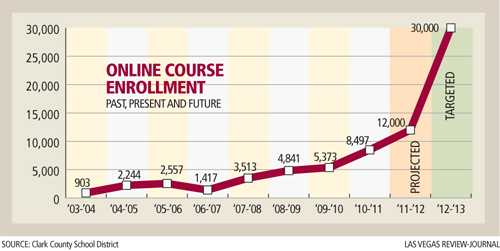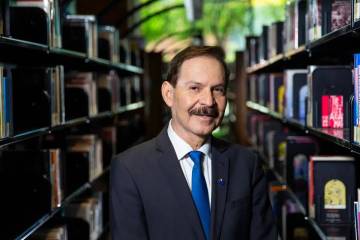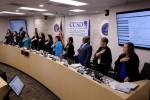County students at Virtual fulfill graduation requirements online
Fifteen-year-old Jared Smith sat in a high school classroom for the last time on Monday.
No, he's not a Doogie Howser kind of genius graduating early. He's not being home-schooled by his mom. And he's not dropping out.
He'll still be taking the same Clark County School District classes as other sophomores, but through Virtual High School, a sort of "Tron" educational environment where he completes homework, takes test and even communicates with his teacher and classmates on the Internet through instant messaging and in chat rooms.
No extra cost is involved and there's still a student prom. A campus at Flamingo Road and McLeod Drive provides a meeting place for students who want face-to-face help.
"For some students, I will go the entire semester and not hear their voices," said Kelli Sommer, chairwoman of Virtual's English department.
Virtual High School -- opened in 2004-05 -- is nothing new. It has 150 full-time students, but projects 12,000 total enrollments this school year. That's because online courses are now available to students at all 49 district high schools this year, allowing them to remain at their home schools while retaking a class or two through Virtual.
Under new Superintendent Dwight Jones, the district is relying on online courses more than ever and students have jumped at the new opportunity. About one-third of Virtual students are seniors playing catchup on the credits they need. In a district where half of its 20,000 seniors started the school year behind, it advances a critical goal: get them to graduation.
Jones wants to increase Virtual's enrollment to 30,000 in 2012-13. That equates to about one in 10 students taking online courses in Clark County, the nation's fifth-largest district of just over 300,000 students. The district also is developing plans to make online courses available in middle schools.
CLASSROOM VERSUS COMPUTER
Just one course is how it started for Jared Smith.
He was more or less forced into it because Boulder City High School cut the biology class he needed, forcing students to take it in a school computer lab. Next came the question of how he should approach taking Spanish.
"He was going to school to take a class he could take at home," said Jared's mother, Susie Smith. "He asked, 'Can't I do all my classes this way?' "
But are students such as Jared Smith, who opt for an online education, skipping the growing pains of high school, the bedrock of TV shows and films such as "Beverly Hills, 90210," "American Pie," and "The Breakfast Club"?
Does the online experience lack the imperatives of the classroom, such as having to work with others or developing social skills that are also needed in the workplace?
That was Susan Chmura's concern when her daughter, now a senior who has attended Virtual the past four years, enrolled at the school. Chmura fondly remembers her high school days of being a cheerleader, going to football games and being with friends.
"There's so much more than the academics," Chmura said. "With this, it would be so easy to stay in your pajamas and not do anything."
As for those just making up a class or two, they're still going to school, but does an improved graduation rate come at a cost? Is an online course separate and still equal?
High schools seem to think the benefits outweigh possible pitfalls and have set aside Virtual computer labs on their campuses. About a dozen high schools had these labs last year. Now, half of the district's 49 high schools have Virtual labs.
Clark High School was one of the first, and its lab is full every period each day, used by about 260 students this semester, Principal Jill Pendleton said.
"Every school should have this for every period," English teacher Elizabeth Hammel said Thursday.
PARENTAL FEARS NOT REALIZED
Susan Chmura's concern that her daughter, Heather, would miss out on experiences because of Virtual turned out to be unfounded, she said. Heather's taken a key role in the family's business, becoming one of the youngest managers in Wetzel's Pretzels national chain. The family owns two Wetzel's locations in Las Vegas and another business. Heather manages all three and also has started to take a behind-the-scenes role in bookkeeping.
"People say we're the anti-social kids, but look at me," said Heather while taking a break from Wetzel's at Las Vegas Premium Outlets-South. "I'm dealing with people all day. This has taught me lots of things, real world experiences."
Heather was on Virtual's student council for two years and is a member of the National Honor Society at her home school, Desert Oasis High School.
Jared Smith was concerned this summer that he might be missing out and briefly went back to Boulder City High School this fall.
"But there's a lot of wasted time in school, like today," he said Monday of students coming in late or causing trouble.
He still sees all his friends on the year-round swim team, the Boulder City-Henderson Heatwave. His demanding practice schedule was his main reason for switching to Virtual.
FORMAT NOT SUITED FOR EVERYONE
Students attend Virtual for all kinds of reasons.
Laura Martinez, 17, has a 1-year-old daughter and couldn't spend all day in class. Plus, Virtual has a young parents club.
Zhanae Hawkins was at Liberty High School for three years but was falling behind.
"School wasn't working," she said of switching to Virtual her senior year to make a mad dash to graduation. "I'm terrible at sitting in the classroom and listening for hours."
She went against the opinions of her friends to make the switch.
"My friends called me a dropout," Hawkins said. "I'm just focusing on me, graduating."
Virtual is not for everyone. It requires self-motivation, Heather Chmura said.
"There's no teacher nagging you to get everything done," she said, suggesting it is a good fit for focused students.
It also fits those seeking redemption, said Clark High School teacher Hammel, surveying a classroom of juniors and seniors.
"Every one of them is motivated because they want to graduate," Hammel said.
But are they learning what they need? Is it an equivalent education?
"I think it might hurt me in college," Chmura said. "I've never had a closed-book test in four years."
Then again, college professors expect a lot from students. No one will hold their hands in college, same as at Virtual High School.
PUSHING STUDENTS AND TEACHERS
As for Virtual's requirements for passing classes, teachers and students contend it takes more effort, not less than is required at regular high school, and from teachers as well as students.
Andrea Damore taught in the classroom for four years, but being a Virtual teacher has forced her to be more creative, she said. Her students don't take multiple-choice tests. They could just search the Internet for the answer.
"I don't ask, 'Who was the first president?' " Damore said. "I don't ask 'what' but 'why.' "
Students must apply their knowledge. For example, her U.S. government students last year had to go to the New York Times' website and use a feature to decide what to cut from the federal budget to balance it. They then had to defend their reasoning.
"It makes me think outside of the box more," Jared Smith said. "Learn, not memorize."
Plus, students get more one-on-one time. Teachers have office hours, are available by phone, texting and emailing during the day and into the evening. They also are required to visit struggling students.
"You can always get a hold of teachers somehow," Heather Chmura said.
Oversight of Damore and 11 other Virtual teachers is also intensive, Virtual Curriculum Administrator Lynda Spann said Wednesday. She can log on to a course at any time and see every single thing that class is doing or has done. In a regular classroom, she would only get a snapshot of what's going on by observing from the back.
"They're under the microscope in an online world," Spann said.
ASSESSING QUALITY OF EDUCATION
There is an objective way to test claims that a virtual education is equal to or better than attending traditional school: Nevada's high school proficiency exams. Every high school student, including those at Virtual, must come to school to take these standardized tests in science, reading and math. To graduate, they must pass. No outside help. No Internet.
And the pass rate for Virtual's full-time students is noticeably higher than the average for the district or state. About 87 percent of Virtual students who took the math test in 2010-11 passed. All who took the reading test passed, and 90 percent passed the science test. The district and state pass rates hover around 70 percent.
Virtual also was one of only 10 district schools ranked as high-achieving under No Child Left Behind in 2010-11. But the statistics don't attract Jared Smith's younger sister to Virtual. She sees her brother still asleep when she leaves for school.
"And he's playing video games in his sweats when she comes home," Susie Smith said. "I think it's in her head a little bit."
Some parents tell Smith they wish Virtual had been around when they were young. "Others say they wouldn't have missed those years for the world."
Contact reporter Trevon Milliard at tmilliard@reviewjournal.com or 702-383-0279.






























